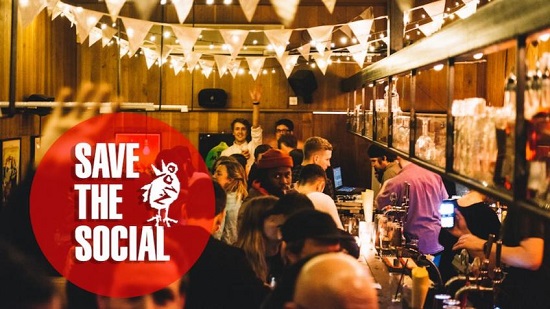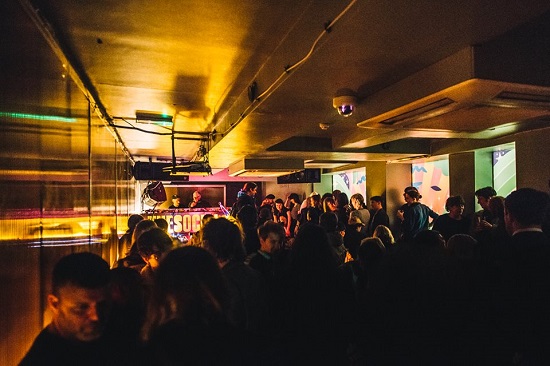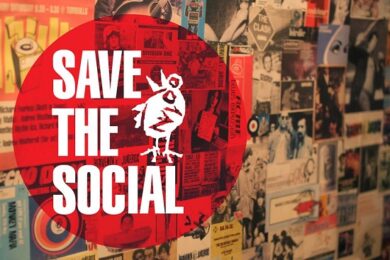Early on in my time at the Quietus I remember walking into the office on a Tuesday afternoon, even later for work than usual. ‘Where have you been then?’ my colleagues asked with a frown. They grinned as soon as I told them I had been to The Social for the first time. It felt like a rite of passage. I had been wondering just why what was supposed to be a regulation interview with an upcoming band had turned into one of the best nights I’d had in London, a city that still felt culturally impenetrable, a night surrounded by strangers but at complete, joyous ease. I kept returning to the venue, tucked down a tiny side street, to find that it was no fluke. Every time I went back I’d end up in a group of extraordinarily lovely people. They all knew each other but it wasn’t a clique, they simply had a shared philosophy, a belief in the magical potential of music that extends from the owners to the bar staff, the doormen to the sound technician.
Which is why it was so devastating to hear last week that this bar – one of few oases in the dredge of what remains of central London’s culture – is under serious threat from rising rents and a cocktail and wine bar chain who have made an offer to the leaseholder. They’re crowdfunding to buy a controlling share for their survival, and the response has been overwhelmingly heartening. There are countless stories doing the rounds of the strange and wonderful power this venue possesses, the tiny shows by the likes of Aphex Twin, The Chemical Brothers and Beck that it has hosted, and the lasting memories and friendships made. That said, raising £95,000 in just two weeks is a daunting task. The venue is well on its way to their total, but with just a week left, and a substantial sum still to make up, we urge you to contribute whatever you can to their crowdfunder here.
Katherine Cantwell, of the closely-tied Heavenly Records, sums it all up. “The thought of it closing breaks my heart,” she tells tQ. “Where else in London does this kind of magic consistently happen? Plus, The Social has the world’s nicest sound guy, Tall Paul, who provides quality sound for any given night, and, the bar staff are the kindest, and, as for the people who run it? They know how to throw a damn good party.”
“It’s so hard to articulate just what this rare and fantastic place means to me (and so many other people), but it’s gone some way to shaping me as a person by consistently expanding my mind with an unbelievable selection of music, literature, and highly strange conversations (as well as a fair few ill-advised strong drinks) since I was 18,” says Diva Harris, a writer for Caught By The River and tQ, and part of Heavenly’s Token Girl DJs. “It is a meeting point for London’s weird and wonderful, and we just can’t afford to lose another independent music venue – let alone this old sin bunker. It would also be a complete injustice for the venue to fall just short of its 20th birthday!”
Michael Hann, journalist and former music editor of The Guardian calls The Social: “the most aptly named bar in the world. It’s like Six Degrees of Separation brought to life. You go there to meet one person. Someone they know turns up. Then someone that person knows turns up. Then someone that person knows turns up. And so on. You end the evening talking to someone with only the most tenuous connection to the person you actually went there to meet. That makes it all sound like an incestuous music industry hellhole, but that’s precisely what it’s not. It’s not a place where people go to wang on about Q3 promotions and Q4 budgets. It’s a place, I think, where two lots of people go: people who just want to drink nice alcohol at very reasonable prices in a nice room (and who probably don’t know anything about its place in British music), and people who really, really, really love music and who want to talk about it with other people who really, really, really love music. And then everyone goes downstairs and watches a band actually play music. There’s something genuinely magical about it: it feels like a bar where everyone thinks the best of each other. And it’s the only place in the world where I’ve spunked four grand in an evening. Admittedly, that was our 20th wedding anniversary party, and it was a big deal – so please don’t think I’m in the habit of throwing money around. For that alone – one of the best nights I’ve ever had – I’d love The Social. But we did it there because The Social is so brilliant anyway. God, I love that place.”

Robin Turner was one of the four founders of the bar in 1999, along with Jeff Barrett, Martin Kelly and Nick Dewey. “We didn’t really have any grand plans for what was going to happen in there,” he tells me. “It was just the four of us owning a bar in central London. Somewhere to hang out with mates. Early bookings included a crazed Earl Brutus DJ set, an extremely stoned reggae night put on by the guys who did visuals for the Chemical Brothers and a regular Friday afternoon session called the Skiver where we encouraged people to dip work and come and get pissed with us. Seems incredible to think about that now, when everyone is working constantly, never off-line, never seeming to get enough done.
“Before long, we were a regular gig venue (early shows in there by Shack and Doves stick in the brain) and a miniature night club putting on everyone from the Chemical Brothers to the Avalanches. We never planned anything, we just seemed to know what would work, or at least what would be fun even if it didn’t really work; Kieran Hebden playing spiritual jazz to about 30 people at the long-running / poorly attended night the Impulse! Club really was something to behold! Over the years, we’ve tried to stick to that formula – giving promoters and bands and DJs and artists the space to do what they want in the hope that it turns people on.
“There’s too many memories to recount,” he continues. “A few that really stick out include seeing Edna O Brien share a stage with Jarvis, seeing Beck in there playing ‘Raspberry Beret’ after learning it in the bog five minutes before going on, hearing Aphex Twin play an Italo-disco set, seeing Gruff Rhys and Aditya Chakrabortty talking passionately about the upcoming EU referendum, and just sitting in the upstairs bar drinking a pint watching the world come and go, on any given night. Thinking about it now, it feels like The Social has a bit more story left to tell.”
Lee Brackstone was also there the night Beck ended up playing The Social’s basement in 2014. “Back in 2014 we had somehow persuaded Beck to participate in a repertory performance of his ‘Album in the form of sheet music’, Song Reader. It was a unique gig at the Barbican on a Sunday night, in front of 2,500 people. Afterwards, decompressing with ‘the little fella’, I approached his manager, the legendary John Silva, with the idea that Beck might play a secret gig for us the following night at The Social. John said, ‘Ask him’. So I did. And he said yes, immediately. We had less than 24 hours to orchestrate a secret gig by one of the world’s biggest popstars in one of the smallest music venues in the world. We put the word out to friends and associates and the buzz started. I met with Silva and Beck before for some food. I noticed Beck, who must be nine stone and five foot three, ate two main courses at dinner and Silva told me, ‘the brain needs a lot of calories’. We took a car to the bar where upstairs had been turned into a green room. A couple of us sat there with Beck, totally chilled, as he tuned his guitar and had a think about what to play. I asked him if he might play a Prince song and he started playing ‘Raspberry Beret’. I immediately started singing and thought ‘JESUS FUCKING CHRIST I AM DOING PRINCE KARAOKE WITH BECK’.

“He then shared some anecdotes about Prince who of course he adored. I left him to his preparation and went downstairs which was packed and buzzing with writers, fans, music people and the usual Social crowd. Beck came down the stairs, walked through the audience of about 100 and got up on stage. He had never even seen the venue before. He launched straight into the first chords of ‘Golden Age’ and I felt like crying that this man whose music I had loved for 20 years was on stage in the bar that I loved most in the world. He played for about 45 minutes, including ‘Raspberrry Beret’. And he forgot the words halfway through. That kind of magic only happens at The Social. It was only disappointing the toilets didn’t explode and flood the stage as they did on another Faber Social night at the bar. There’s something about The Social that makes good things happen. It is an inclusive, generous and wildly creative space.”
There have been some extraordinary shows at The Social over the years, including tQ’s own recent run of quarterly socials featuring the likes of Goat Girl and Black Midi, but The Social’s appeal goes beyond its knack for hosting excellent gigs. Austen Harris remembers an impromptu kickabout on the streets outside after David Beckham’s winner for England against Argentina in the 2002 World Cup with as much fondness as he does a tiny show from the legendary Michael Head with Shack in 2006. Joe Curran, meanwhile, worked behind The Social’s bar on-and-off throughout the 2000s, and recalls the time Mani of Stone Roses fame popped in for a pint.
“Everyone pestered Mani, they couldn’t help it, ‘when are the Roses going to re-form?’,” he says. “I could see it was getting a bit much. He huddled round with his mates and ignored them. Then ‘I am The Resurrection’ came on the Jukebox. Now, I don’t know if someone put it on because Mani was there or if it just happened to be in the queue of tunes. Naturally, the whole bar, who were pretending not to notice Mani, look round. Mani rolls his eyes, puts his head down and carries on talking to his mates. I notice that other people in the room have started listening to the tune rather than talking. Then the last chorus finishes, and the jam that follows starts with the solo bass line. Everyone is pretending not to look at Mani. He looks pissed off. The quiet part of the jam is leading up to the snare roll that brings in the rest of the tune. Just as we get to the snare roll, Mani stands up grinning, hammers out the snare hits with his hands duh, duh, duh, duh, de-duh-duh, duh and plays the first note on air bass. The whole bar goes wild, shouting, drink spilling, pure rock & roll joy. It’s fucking nuts. It couldn’t have happened in another bar.”
A quick search of Twitter will lead you to countless tales like this, and almost everyone tQ spoke to will have plenty more stories to tell. This is but a fraction of what makes The Social so wonderful. Its loss would be heartbreaking, and leave a gaping hole in the musical fabric of Soho, London, and this grim country. If you have anything to spare, please send it their way.
You can help The Social stay open by donating to their Crowdfunder campaign here.



